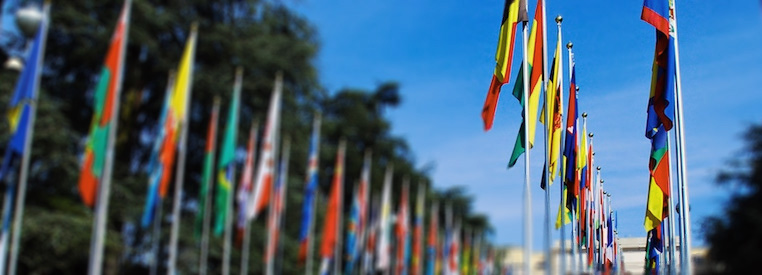26 February 2009
This week the Eminent Jurists Panel, an independent body of experts convened by the International Commission of Jurists (ICJ), will present the results of a worldwide investigation into the impact of counter-terrorism laws and practices on human rights in Washington D.C.. The report Assessing Damage, Urging Action is the result of a three-year investigation that draws on sixteen hearings covering forty countries in all regions of the world.
The report concludes that many governments have confronted the threat of terrorism with ill conceived measures that have undermined cherished values and resulted in serious violations of human rights. It illustrates the devastating effects that notorious counter-terrorism measures such as extraordinary rendition, torture, arbitrary detention, and unfair trials have had on human rights worldwide. It warns of the increasing secrecy preventing accountability, and the danger of “temporary” measures becoming permanent features of law and practice in many states, including in democratic societies.
“We urge states to seize this critical moment to take stock and repeal abusive laws and policies enacted in recent years. In particular, the new political climate in the United States should enable it to assume a leadership role in restoring human rights while countering threats of terrorism”, said Mary Robinson, former President of Ireland and former United Nations High Commissioner for Human Rights and President of the ICJ.
The report calls for the rejection of the war paradigm in the US as a basis for its counter-terrorism policy. It notes that the US has applied the law of war to persons not involved in armed conflict, and in real situations of warfare it has distorted, selectively applied and ignored otherwise binding rules, including fundamental human rights guarantees. This has resulted in human rights violations, including torture and cruel or inhuman treatment, arbitrary and secret detention and the denial of the right to a fair trial.
“The recognition by the new administration that human rights and security are not mutually exclusive is of paramount importance,” said Justice Arthur Chaskalson, former Chief Justice of South Africa and first President of its Constitutional Court. “The United States should now fully repudiate the war paradigm and repeal the laws and policies grounded in it”.
The report emphasizes that the criminal justice system should be at the heart of the response to terrorism. “Trials of civilians by military courts, prolonged detention without charge or trial and the denial of remedies have been used with dire consequences in the past in other parts of the world. We should heed those lessons and break with the legacy of the last seven years”, said Robert K. Goldman, Professor of Law at American University Washington College of Law.
Assessing Damage, Urging Action was launched last week in Geneva, Bangkok and London and will be presented Friday, February 27 at 9:30 am at the Brookings Institution in Washington D.C. The Panel members will also hold private meetings with senior representatives of the US Administration and Congress.
Background information
The members of the Eminent Jurists Panel:
- Justice Arthur Chaskalson (South Africa), former Chief Justice of South Africa, first President of South Africa’s Constitutional Court and Chair of the Eminent Jurists Panel;
- Ms. Mary Robinson (Ireland), former President of Ireland, former UN High Commissioner for Human Rights, and ICJ President;
- Professor Robert K. Goldman (USA), Professor of Law at the American University in Washington D.C. former President of the Inter-American Commission on Human Rights and former Independent Expert of the United National Commission on Human Rights on counter-terrorism and human rights;
- Professor Georges Abi-Saab (Egypt), Emeritus Professor of International Law at Graduate Institute of International and Development Studies, Geneva, former judge at the International Criminal Tribunals for the Former Yugoslavia and Rwanda, and member of the World Trade Organization’s Appellate Body;
- Ms. Hina Jilani (Pakistan), lawyer of the Supreme Court of Pakistan and former UN Special Representative of the Secretary General on the situation of human rights defenders;
- Professor Vitit Muntarbhorn (Thailand), Professor of Law at Chulalongkorn University, Bangkok and UN Human Rights Council’s Special Rapporteur on the situation of human rights in North Korea;
- Professor Stefan Trechsel (Switzerland), judge ad litem at the International Criminal Tribunal for the former Yugoslavia, former President of the European Commission on Human Rights and Emeritus Professor of Law at University of Zurich;
- Justice Raúl Zaffaroni (Argentina), Judge of the Supreme Court of Argentina, Emeritus Professor at the University of Buenos Aires and former Director of the UN’s Latin American Institute for the Protection of Crime and the Treatment of Offenders.
Countries and regions covered by the investigation:
Australia, Canada, Colombia, East Africa (Kenya, Tanzania and Uganda), the European Union and its member states, Israel and the Occupied Palestinian Territory, the Middle East (Egypt, Jordan, Syria and Yemen), North Africa (Algeria, Morocco and Tunisia), Pakistan, the Russian Federation, South Asia (Bangladesh, India, Maldives, Nepal and Sri Lanka), South-East Asia (Indonesia, Malaysia, the Philippines and Thailand), the Southern Cone countries of Latin America (Argentina, Brazil, Chile, Paraguay and Uruguay) on lessons from the past, the UK (London and Belfast) and the United States.
Download the executive summary and the full report.
For more information, please contact David Lerner (+1 212 2605000) or Gerald Staberock (+41 793775446).
